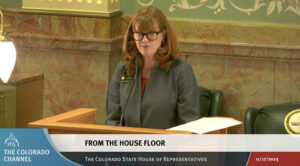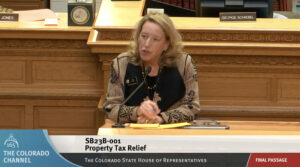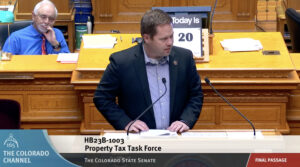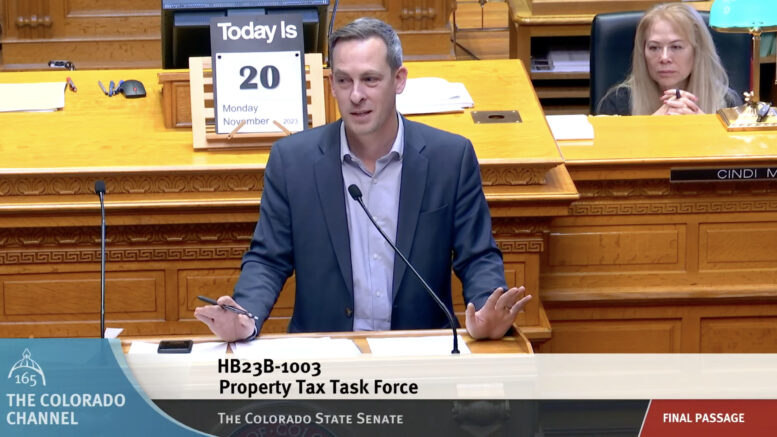Colorado legislators wrapped up a surprisingly dramatic special session Monday by passing bills to offer limited property-tax relief to homeowners and study longer-term solutions to the state’s property-tax quandaries, changing both bills slightly from how they looked after the first day.
The moves leave commercial property owners without any short-term relief as property-tax valuations rise by an average of 40% statewide this year but give them some voice in crafting a potential solution for the coming years. And with the Legislature unable to reach bipartisan agreement on any significant bills, they likely set up property tax as one of the main focal points of the coming 2024 legislative session, along with issues such as affordable housing and air-pollution regulation.
The session followed statewide voters’ overwhelming defeat earlier this month of Proposition HH, which would have offered reductions in the rise of both residential and nonresidential property tax bills in exchange for a gradual lifting of the Taxpayer’s Bill of Rights revenue cap. Without extra money a cap raise would have afforded, majority legislative Democrats sought to limit newly offered tax relief to $200 million statewide, to fit it into a placeholder left in the budget to backfill local governments for part of their revenues lost due to property-tax breaks.
Residential property-tax relief
Senate Bill 1, the primary vehicle for those efforts, would reduce valuations of all residential properties for the 2023 tax year by $55,000 and cut their tax-assessment rate from 6.765% to 6.7% for this year. After the bill passed both chambers on a purely partisan, Democrat-led vote, Gov. Jared Polis was scheduled to sign it into law at 5:30 p.m. Monday.
The bill offered smaller tax rebates than Republican versions of the measure, which sought $80,000 valuation cuts on homes, $60,000 cuts on commercial buildings and assessment rates of 6.5% on residences and 25% on nonresidential properties (down from 29%). Assistant House Minority Leader Rose Pugliese, R-Colorado Springs, estimated the Democratic bill will give $437 million in tax relief when combined with breaks from a separate 2022 law, while the GOP plan would have offered $1.372 billion, using money from the state’s general-fund reserves.

Colorado House Speaker Julie McCluskie provides over the special legislative session on Friday, its first day.
Democratic leaders celebrated SB 1, with Senate President Steve Fenberg, D-Boulder, saying that it and other legislation from the four-day session provides “short-term relief to those most vulnerable to the rising cost of living.” Legislators also OK’d bills to add $30 million in rental assistance, expand the Earned Income Tax Credit and offer equal TABOR refund checks of about $850 to all Coloradans rather than tier the checks based on residents’ income levels.
“This responsible package delivers for the Coloradans who are feeling the brunt of our affordability crisis and returns more money to the people who need it the most by boosting the incomes of hardworking families and making Colorado more affordable,” House Speaker Julie McCluskie, D-Dillon added in a statement afterward.
Republican pushback
But Republicans criticized the effort for providing little relief during a crisis moment and for continuing to use TABOR refunds to help pay backfill, though those refunds were agreed to by members of both parties as part of Senate Bill 22-238. And several, such as Castle Rock GOP Rep. Lisa Frizell, said that the failure to offer any commercial-property relief at a time of rising rents and tax bills will come back to hurt small businesses especially.
“I’m talking about those neighbors of ours that own a business, have dumped their entire lives’ savings into that business and work hard,” Frizell said before voting against SB 1, which was sponsored by Fenberg and Sen. Chris Hansen, D-Denver. “Property tax is a huge component of their cost of doing business, and we just increased that.”

Colorado state Rep. Lisa Frizzel criticizes a bill during the legislative special session on Monday.
It will be only two weeks before the next discussions about property taxes begin, and those will come through the new Commission on Property Tax, which was created through House Bill 1003, sponsored by Rep. Marc Snyder, D-Manitou Springs. After going through several different iterations over the weekend, the final bill would create a 19-member task force that will meet from Dec. 4 through March 15 to recommend systemic changes to the state’s property-tax system after studying issues such as its impact on housing affordability, commercial property and development.
Republican concerns in the Senate led to a reduction of legislators (from six to four) on the commission as well as an addition of county commissioners (rising from two to five) as compared to the bill that passed the House. Nodding to business needs, the final commission includes the executive director of a statewide or regional business organization and an individual representing an organization that represents Colorado commercial or residential property owners.
Details of property-tax relief commission
Both business-focused seats will be appointed by Republican legislative leaders, and Hansen assessed the final makeup of the commission as getting more GOP than Democratic appointments, despite Democrats holding 69 of the 100 legislative seats. Still, HB 1003 passed the House on a purely partisan Democratic-led vote and made it through the Senate by a 20-15 margin, with three Democrats joining all 12 Republicans In opposing it.
Senate Minority Leader Paul Lundeen, R-Monument, said the final opposition came down to the inclusion or exclusion of a few commission members. GOP Sen. Mark Baisley of Woodland Park specifically criticized the appointment from a “statewide organization that represents Colorado educators,” which he said will be from the Colorado Educators Association teachers’ union.

Colorado state Sen. Kyle Mullica speaks Monday in the Senate about his bill to create a commission to study long-term improvements to Colorado’s property-tax system.
But sponsoring Sen. Kyle Mullica, D-Federal Heights, and Fenberg, who negotiated many of the compromises, said that they believe the focused and quick work the commission will do will be nonpartisan and likely produce more consensus recommendations than what has come so far.
“I think it’s a good thing when we work together,” Mullica said. “I think it’s a good thing when we bring diverse perspectives into policy. And I think it’s a good thing when we bring different voices to the conversation.”
Multiple confrontations
For being just a four-day session, the legislative gathering had its fair share of drama.
Senate Republicans held up passage of SB 1 on Friday when they blocked the usually non-controversial special reading calendars that allow bills to be considered on the floor the same day they pass committees, and they extended the session by an extra day. However, their efforts to get concessions from Democrats largely were unsuccessful, as the only major change to the bill over the course of the weekend was to boost the valuation cut for homes from $50,000 to $55,000 for this tax year.
Then on Monday, the House ground to a temporary halt when Democratic Rep. Elisabeth Epps of Denver added “Free Palestine” to the end of a floor speech and then sat in the House gallery with pro-Palestinian protestors and shouted that Republican Rep. Ron Weinberg of Loveland was out of order when the Jewish immigrant attempted to respond from the floor. Democratic leaders shut down the gallery and required protestors to leave but only after a lengthy, heated back-and-forth with Epps, who did not return to the floor to cast any further votes.
Legislators are scheduled to return to the Capitol on Jan. 10 to begin the 120-day 2024 session.
